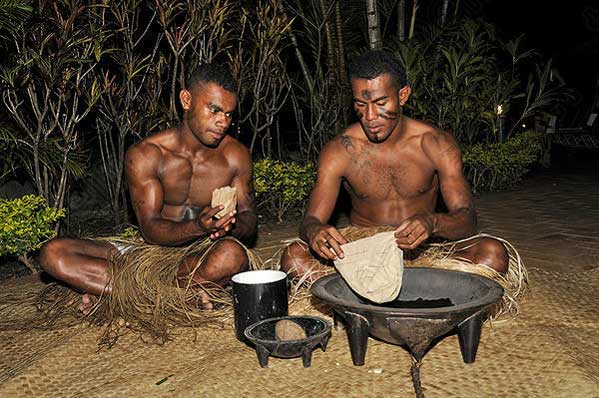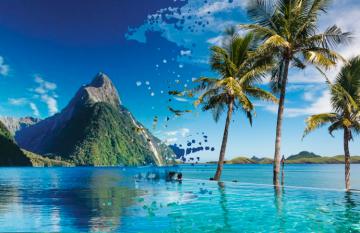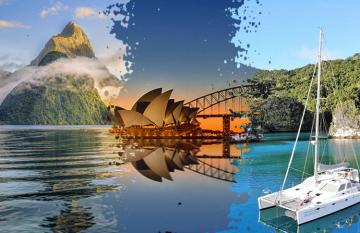
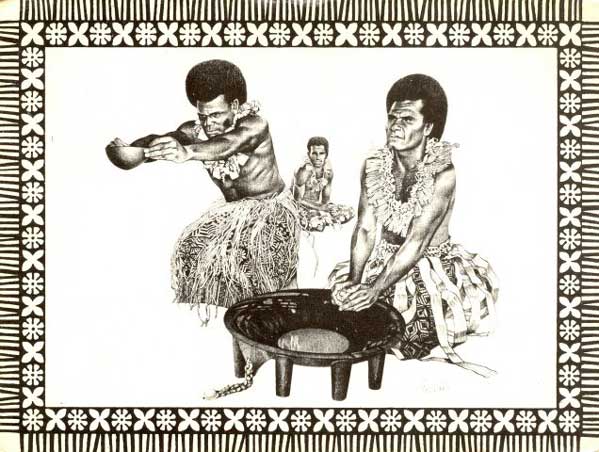
Cultivated and consumed by humans for well over 3000 years, Kava is still used today by a wide range of Pacific societies for medicinal, spiritual, and recreational purposes. The feelings of camaraderie that Kava drinking evokes have made it a symbol for peace and friendship in many island nations of the Pacific. Participating in a traditional Kava ceremony can be an insightful experience, on your Fiji and New Zealand holiday or your Australia, Fiji and New Zealand holiday.
The ceremony is an integral part of village life in Polynesian, Melanesian and Micronesian cultures. Many believe the awareness invoked by Kava brings one into communion with the gods and their ancestors. If the opportunity arises or the invitation is extended to attend a Kava ceremony within a local village (not one put on by your resort) there is no better way to gain an incite into the local people and their culture.
Kava Q & A
What is Kava?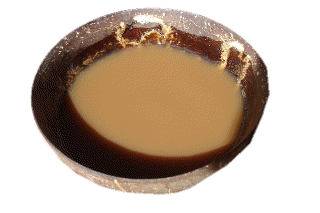 Kava is beverage made from the root of Piper methysticum - a species of pepper cultivated throughout the South Pacific. It is either chewed or pounded and mixed with water to produce a brownish brew to drink. Kava plays a prominent role in social interaction.
Kava is beverage made from the root of Piper methysticum - a species of pepper cultivated throughout the South Pacific. It is either chewed or pounded and mixed with water to produce a brownish brew to drink. Kava plays a prominent role in social interaction.
The Benefits of Kava? The Polynesians value Kava for its medicinal properties and it is often sold as herbal medicine. When drunk, the active chemical acts as a sedative and general muscle relaxant, making it a natural choice for the relief of anxiety, stress and insomnia. The roots analgesic properties are also used treat a multitude of aliments like, phobias, sore muscles, PMS, and menopausal symptoms. Kava is also chewed to alleviate the symptoms of a sore throat.
What are the effects of Kava? Kava users report a state of relaxation, a mild euphoria without feeling drugged, along with decreased muscle tension and a greater clarity of thought. A tingling and numbness on your tongue is a good indication that it is having the desired effect. Kava is a very mild narcotic and guarantees a good nights sleep - you will wake up feeling well rested and energized. You know when you have had too much Kava when you have the overwhelming compulsion to sleep, however, you will retain the ability to think clearly right up to the time you drop off and even when consumed in great quantities, Kava will not fog the mind or produce delirium.
How long do the effects of Kava last? The effects of Kava lasts for one to two hours leading to a restful sleep with no hangover. The calming effect is said to last well into the next day.
How it tastes? Unfortunately Kava tastes like bitter muddy water - an acquired taste.
Where to go for a true Kava session (Fiji Only) In Fiji most resorts seem to have a kava night on offer, during which the version of kava is watered down, so to really experience Kava, sign up for a village visit and head for the highlands. If you are in any of the other South Pacific Islands - just ask a local.
Fijian Tradition In Fiji, old customs still prevail. Turning down an offer to drink a bowl of Kava is considered insulting. In traditional times, kava all over the South Pacific was prepared by young village girls, who chewed the raw Kava into a soft pulp before adding water. 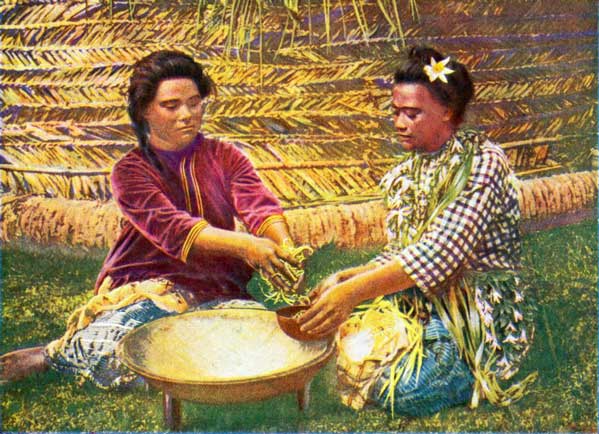 Today, the head of the ceremony mixes a powdered root with water in a large hardwood bowl, called a Tanoa. The liquid is then strained through a cloth to keep out the impurities. When ready, he claps cupped hands to make a hollow poping sound. Sitting crossed legged on the floor, guests are arranged in a circle and offered a small bowl made from half of a coconut shell containing the liquid. The guest must clap before and after drinking. Guests are served first, then others according to their status in the group. The drink is not to be sipped - It should be drunk in one continuous drink. The clapping of hands and the word "maca" signifies that you have properly emptied your cup.
Today, the head of the ceremony mixes a powdered root with water in a large hardwood bowl, called a Tanoa. The liquid is then strained through a cloth to keep out the impurities. When ready, he claps cupped hands to make a hollow poping sound. Sitting crossed legged on the floor, guests are arranged in a circle and offered a small bowl made from half of a coconut shell containing the liquid. The guest must clap before and after drinking. Guests are served first, then others according to their status in the group. The drink is not to be sipped - It should be drunk in one continuous drink. The clapping of hands and the word "maca" signifies that you have properly emptied your cup.
Kava Etiquette - Things you should know.
- Hats and sunglasses are not to be worn it shows disrespect to the chief.
- Shoes are not to be worn inside buildings.
- Women must have their knees and shoulders covered and it is respectful for men to do the same.
- Never touch Fijian person's head, it is considered an insult.
- When visiting a village, it is customary to take a gift of kava root. This can be purchased from local markets and does not cost much.
- You will be asked to drink kava with the villagers on arrival.
- It is customary to drink the bowlful in one gulp.
- When you have finished the contents, return the bowl and clap three times.
- It is impolite to sit with your legs stretched out in front of you.
Recent Posts
Blog Categories
Blog archives
- February 2025 (3)
- January 2025 (6)
- December 2024 (12)
- November 2024 (3)
- October 2024 (2)
- July 2024 (2)
- May 2024 (12)
- April 2024 (2)
- March 2024 (2)
- January 2024 (2)
- November 2023 (10)
- October 2023 (4)
- August 2023 (1)
- May 2023 (2)
- April 2023 (2)
- March 2023 (17)
- February 2023 (4)
- January 2023 (4)
- December 2022 (11)
- November 2022 (7)
- October 2022 (1)
- May 2022 (1)
- March 2022 (3)
- February 2022 (3)
- January 2022 (1)
- December 2021 (1)
- August 2021 (1)
- June 2021 (1)
- May 2021 (2)
- February 2021 (1)
- August 2020 (1)
- July 2020 (1)
- May 2020 (1)
- April 2020 (1)
- March 2020 (1)
- January 2020 (1)
- December 2019 (1)
- November 2019 (1)
- October 2019 (1)
- September 2019 (1)
- August 2019 (5)
- July 2019 (2)
- June 2019 (1)
- May 2019 (3)
- April 2019 (1)
- March 2019 (1)
- February 2019 (1)
- January 2019 (1)
- December 2018 (1)
- November 2018 (1)
- September 2018 (1)
- August 2018 (1)
- July 2018 (1)
- June 2018 (1)
- May 2018 (1)
- April 2018 (1)
- March 2018 (1)
- February 2018 (1)
- January 2018 (1)
- December 2017 (1)
- October 2017 (1)
- September 2017 (1)
- August 2017 (1)
- July 2017 (1)
- June 2017 (1)
- May 2017 (1)
- April 2017 (1)
- March 2017 (1)
- February 2017 (1)
- January 2017 (1)
- December 2016 (1)
- November 2016 (1)
- October 2016 (1)
- September 2016 (1)
- August 2016 (1)
- July 2016 (1)
- June 2016 (1)
- May 2016 (1)
- April 2016 (1)
- March 2016 (1)
- February 2016 (1)
- January 2016 (1)
- December 2015 (1)
- November 2015 (1)
- October 2015 (1)
- September 2015 (1)
- August 2015 (1)
- July 2015 (1)
- June 2015 (1)
- May 2015 (1)
- April 2015 (1)
- March 2015 (1)
- February 2015 (1)
- January 2015 (1)
- December 2014 (1)
- November 2014 (1)
- October 2014 (1)
- September 2014 (1)
- July 2014 (1)
- June 2014 (3)
- May 2014 (1)
- April 2014 (1)
- March 2014 (1)
- February 2014 (1)
- January 2014 (1)
- November 2013 (15)
- October 2013 (1)
- September 2013 (1)
- August 2013 (1)
- July 2013 (1)
- May 2013 (1)
- April 2013 (1)
- March 2013 (1)
- February 2013 (1)
- January 2013 (1)
- December 2012 (1)
- November 2012 (2)
- October 2012 (2)
- September 2012 (2)
- August 2012 (2)
- July 2012 (2)
- June 2012 (2)
- May 2012 (2)
- April 2012 (3)
- March 2012 (2)
- February 2012 (2)
- January 2012 (2)
- December 2011 (2)
- November 2011 (1)
- October 2011 (2)
- September 2011 (1)
- August 2011 (1)
- July 2011 (1)
- June 2011 (1)
- May 2011 (1)
- April 2011 (1)
- March 2011 (1)
- February 2011 (1)
- January 2011 (1)
- December 2010 (1)
- November 2010 (1)
- October 2010 (1)
- September 2010 (1)
- August 2010 (1)
- July 2010 (1)
- June 2010 (1)
- May 2010 (1)
- March 2010 (1)
- February 2010 (1)
- January 2010 (1)
- December 2009 (1)
- November 2009 (1)
- October 2009 (1)
- September 2009 (1)
- August 2009 (1)
- July 2009 (1)
- June 2009 (1)
- May 2009 (1)
- April 2009 (1)
- March 2009 (1)
- February 2009 (1)
- January 2009 (1)
- December 2008 (1)
- May 2005 (1)


